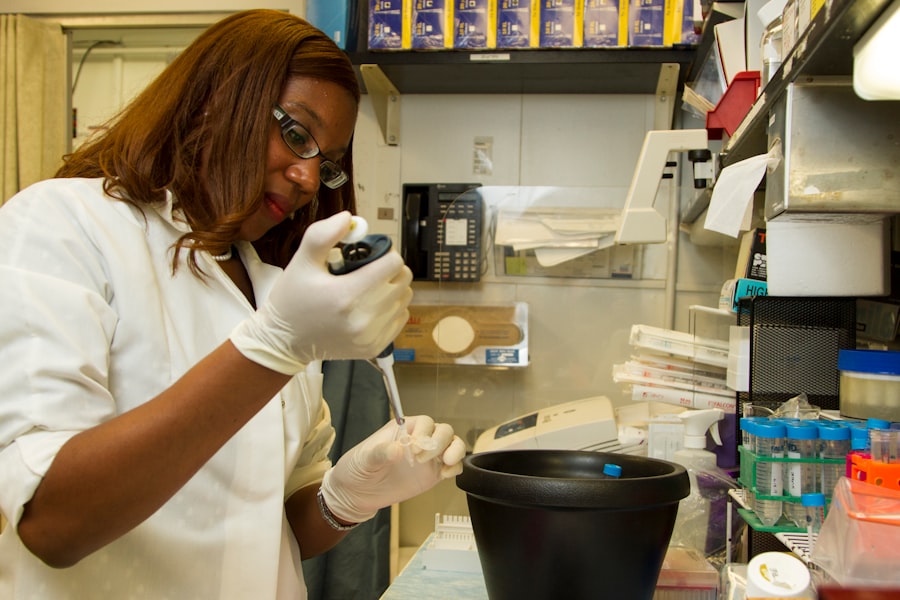Biotechnology is a rapidly expanding field that integrates biology and technology to create products and innovations that enhance human life. This multifaceted industry encompasses pharmaceuticals, agriculture, environmental science, and healthcare. Biotechnology careers provide opportunities for individuals passionate about making positive global impacts through scientific advancements.
Professionals in this sector engage in cutting-edge research and development, creating new medications, enhancing agricultural processes, and developing sustainable solutions to worldwide challenges. The diverse nature of biotechnology careers accommodates individuals with various educational backgrounds and skill sets. Biotechnology professionals are at the forefront of scientific innovation, with the potential to significantly influence society.
Their work ranges from developing novel disease treatments to creating sustainable agricultural practices, playing a crucial role in shaping the future. The field is characterized by constant evolution, with daily discoveries and advancements. This dynamic environment is ideal for individuals passionate about science and technology.
The biotechnology industry offers numerous career paths, including research, product development, and regulatory affairs, providing a wide array of opportunities for those interested in this field.
Key Takeaways
- Biotechnology careers offer a wide range of opportunities in various industries such as healthcare, agriculture, and environmental science.
- A bachelor’s degree in biotechnology, biology, or a related field is typically required for entry-level positions, while advanced degrees may be necessary for higher-level roles.
- Job opportunities in biotechnology include research and development, quality control, regulatory affairs, and sales and marketing.
- Career paths in biotechnology can lead to roles such as biotechnologist, bioinformatician, clinical research associate, and bioprocess engineer.
- Salaries in biotechnology careers can vary depending on the specific role, industry, and level of experience, with benefits often including healthcare, retirement plans, and professional development opportunities.
Education and Training Requirements for Biotechnology Careers
Education and Qualifications
Most entry-level positions in biotechnology require at least a bachelor’s degree in biology, chemistry, biochemistry, or a related field. However, many employers prefer candidates with advanced degrees, such as a master’s or Ph.D. in biotechnology or a related discipline.
Key Skills and Abilities
In addition to formal education, individuals pursuing biotechnology careers should possess strong analytical, problem-solving, and critical thinking skills. They should be able to work effectively in a team environment and have excellent communication and organizational abilities.
Practical Experience and Continuing Education
Hands-on training and experience through internships or co-op programs can provide valuable practical experience and allow individuals to apply their knowledge in real-world settings. Many employers also look for candidates with relevant laboratory experience and technical skills, such as proficiency in molecular biology techniques, bioinformatics, or bioprocessing. Furthermore, continuing education and professional development are essential for individuals in biotechnology careers, as the field is constantly evolving with new technologies and advancements.
Job Opportunities in Biotechnology

Biotechnology careers offer a wide range of job opportunities across various industries. In the pharmaceutical sector, professionals work on developing new drugs and therapies to treat diseases and improve patient outcomes. This can include roles in research and development, clinical trials, regulatory affairs, and quality control.
In the agricultural industry, biotechnology professionals focus on developing genetically modified organisms (GMOs) and improving crop yields through genetic engineering and bioprocessing. Other job opportunities in biotechnology include environmental science, where professionals work on developing sustainable solutions for waste management, pollution control, and renewable energy. Biotechnology careers also extend to the healthcare industry, where professionals work on developing medical devices, diagnostic tools, and personalized medicine.
This can include roles in medical research, product development, and regulatory affairs. Additionally, there are opportunities in academia and government agencies for individuals interested in pursuing research and policy development in biotechnology. With such a diverse range of job opportunities, individuals interested in biotechnology careers have the flexibility to explore different industries and find a role that aligns with their interests and skills.
Career Paths in Biotechnology
Biotechnology careers offer diverse career paths for individuals with different interests and skill sets. In research and development, professionals work on discovering new technologies and products that have the potential to revolutionize industries. This can include roles in molecular biology, genetics, bioinformatics, and drug discovery.
Product development is another career path within biotechnology, where professionals focus on bringing new products to market through clinical trials, regulatory approval, and commercialization. Quality control and regulatory affairs are also important career paths within biotechnology, ensuring that products meet safety and quality standards and comply with regulatory requirements. For individuals interested in business and management, there are opportunities in biotechnology for roles such as project management, marketing, sales, and business development.
These roles involve working closely with cross-functional teams to bring products to market and drive business growth. Additionally, individuals with a passion for teaching and mentorship can pursue careers in academia or training within the biotechnology industry. With so many diverse career paths to explore, individuals interested in biotechnology careers have the opportunity to find a role that aligns with their strengths and interests.
Salary and Benefits in Biotechnology Careers
Biotechnology careers offer competitive salaries and benefits for professionals at all levels. According to the U.S. Bureau of Labor Statistics, the median annual wage for biological technicians was $45,860 as of May 2020.
However, salaries can vary depending on factors such as education level, experience, industry, and geographic location. For example, professionals with advanced degrees or specialized skills may command higher salaries than those with entry-level qualifications. Additionally, individuals working in pharmaceuticals or medical research may earn higher salaries than those working in agriculture or environmental science.
In addition to competitive salaries, biotechnology careers often come with a range of benefits such as health insurance, retirement plans, paid time off, and professional development opportunities. Many employers also offer additional perks such as flexible work arrangements, wellness programs, and tuition reimbursement. As the demand for skilled biotechnology professionals continues to grow, so do the opportunities for competitive compensation packages and career advancement.
Advancements and Trends in Biotechnology Careers

Personalized Medicine: A New Era in Healthcare
One of the most significant trends in biotechnology is the rise of personalized medicine, which involves tailoring medical treatments to individual patients based on their genetic makeup. This has the potential to revolutionize healthcare by improving treatment outcomes and reducing adverse reactions to medications.
Sustainability and Environmental Conservation
Another trend in biotechnology is the increasing focus on sustainability and environmental conservation. Biotechnology professionals are working on developing sustainable solutions for agriculture, waste management, renewable energy, and pollution control. This includes the development of biofuels, biodegradable plastics, and environmentally friendly agricultural practices.
Efficient Production Processes
Additionally, advancements in bioprocessing techniques are leading to more efficient production processes for pharmaceuticals, food products, and industrial chemicals.
Tips for Success in Biotechnology Careers
For individuals interested in pursuing a career in biotechnology, there are several tips for success to keep in mind. First and foremost, it is important to stay updated on the latest advancements and trends in the field by attending conferences, networking with industry professionals, and seeking out continuing education opportunities. Building a strong professional network can also be beneficial for finding job opportunities and staying connected with other professionals in the industry.
Developing strong technical skills through hands-on experience and training is essential for success in biotechnology careers. This can include proficiency in molecular biology techniques, bioinformatics software, laboratory instrumentation, or bioprocessing technologies. Additionally, honing soft skills such as communication, teamwork, problem-solving, and adaptability can help individuals stand out as strong candidates for biotechnology roles.
Finally, gaining practical experience through internships or co-op programs can provide valuable insights into the day-to-day responsibilities of biotechnology professionals and help individuals build a strong foundation for their careers. By staying informed about industry trends, developing technical and soft skills, and gaining practical experience, individuals can position themselves for success in the dynamic field of biotechnology careers. In conclusion, biotechnology careers offer exciting opportunities for individuals who are passionate about making a positive impact on society through scientific innovation.
With diverse job opportunities across various industries, competitive salaries and benefits, and ongoing advancements in technology driving innovation, biotechnology careers are an attractive option for individuals with a strong educational background in science and technology. By staying informed about industry trends, developing technical and soft skills, gaining practical experience through internships or co-op programs, individuals can position themselves for success in the dynamic field of biotechnology careers.
If you’re interested in learning more about how businesses are navigating the challenges of the COVID-19 pandemic, check out this article on COVID-19 Business Aid: PPP vs EIDL. It provides valuable insights into the financial support available to businesses during this difficult time. Understanding the interlink between your business and accountancy is also crucial, and you can find more information on this topic in the article Your Business and Accountancy: How They Interlink. Lastly, creating a positive workplace culture is essential for success, and you can learn more about this in the article Building a Positive Workplace Culture: The Key to Success.
FAQs
What is biotechnology?
Biotechnology is a field of science that involves the use of living organisms or their systems to develop products and technologies that benefit society. It encompasses a wide range of applications in areas such as agriculture, healthcare, and environmental sustainability.
What are the career opportunities in biotechnology?
Career opportunities in biotechnology are diverse and can include roles in research and development, quality control, regulatory affairs, sales and marketing, and production. Biotechnologists can work in various industries such as pharmaceuticals, food and beverage, agriculture, and environmental science.
What are the educational requirements for a career in biotechnology?
A career in biotechnology typically requires a bachelor’s degree in a relevant field such as biology, biochemistry, microbiology, or biotechnology. Some positions may require a master’s or doctoral degree for advanced research or leadership roles.
What skills are important for a career in biotechnology?
Important skills for a career in biotechnology include strong analytical and problem-solving abilities, attention to detail, laboratory techniques, and knowledge of regulatory requirements. Additionally, communication, teamwork, and project management skills are valuable for working in multidisciplinary teams.
What is the job outlook for biotechnology careers?
The job outlook for biotechnology careers is generally positive, with growth expected in areas such as pharmaceuticals, agricultural biotechnology, and environmental science. Advances in technology and an increasing focus on sustainability are driving demand for biotechnology professionals.



